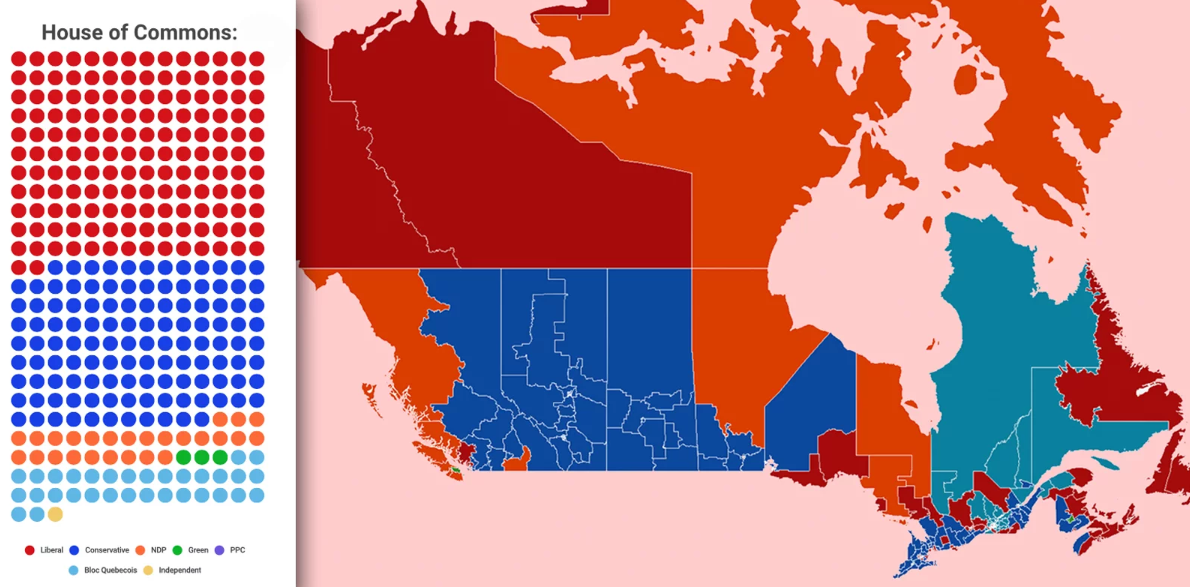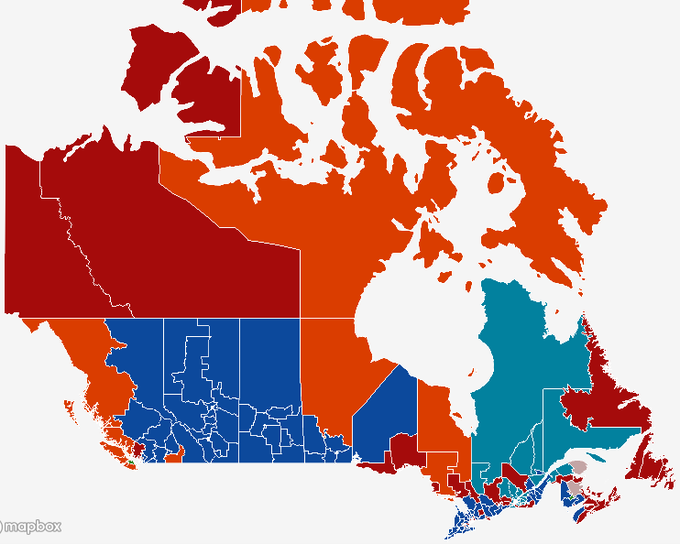Following the reelection of Justin Trudeau as Prime Minister with a Liberal minority, #Wexit, or Western exit (a play on Brexit), immediately began trending on Twitter, with separatist accounts gaining thousands of new followers.
One of the most important takeaways from the election is the blue sweep throughout Alberta and Saskatchewan. Both provinces have expressed growing indignation over the other provinces’ dependence on the oil industry, while simultaneously trying to stifle Alberta’s business prospects and economic growth by opposing pipelines.
Last night was very clear
Canada is broken
Today Oct 22 the clock starts for Alberta Separation, we have a short window to fix Alberta
GAME ON#albertaseparation#wexit pic.twitter.com/WJVgdeZgxU
— Alberta Separation (@albertaseparate) October 22, 2019
People in Saskatchewan have expressed similar discontent, as many in the province benefit from the oil industry and Saskatchewan farmers in Canada’s heartland worry climate policies will target their economy next.
Saskatchewan Separation@saskseparate
Very clear that Canada is broken
The time for Secession #saskseparation
75 people are talking about this
Looking at this results map for #elxn43, i'm coming around to the idea of Alberta separation. In fact, looks to me like we should carve the country up into 5 or 6 new entities. Imagine the happiness when we're not regionally at each others' throats!
19 people are talking about this
In response to Justin Trudeau’s reelection, the Facebook group for VoteWexit.com gained tens of thousands of followers in a matter of hours. According to CTV News, in just 10 minutes the group surged from 4,000 members to 42,000. By 8:00 a.m. the next morning, the group had shot up to over 113,000 members.
Additionally, a Change.org petition for “Alberta Separation/Western Alliance” has gained significant traction, receiving over 20.000 signatures of its 25,000 signature goal at the time of this article’s writing. This occurred in less than 24 hours.
“Trudeau’s re-election is going to tear Canada in half. Good job Quebec. You’ll get your separatism desires. The west is leaving,” wrote one Twitter user.
Another writes, “Western Canada – especially Alberta – is basically the victim of an abusive relationship with the rest of the country. Too scared to actually leave but what’s the benefit of staying? Not sure what the answer is but I’m worried about the next 4 years #wexit.”
The biggest concern, beyond a general shift in sentiment towards climate awareness over economic growth, for the Conservative-dominated provinces is the continued placation of Quebec from politicians in Ottawa who seem to take it out on Alberta. This is despite oil and gas revenues subsidizing Quebec’s social services through equalization payments.
Indeed, Alberta Premier Jason Kenney and Quebec Premier Francois Legault have had multiple verbal jousting matches over just this issue.
Alberta and Sask are all blue. The Bloc, Greens and NDP want to shut down oil. This is the time for #WexIt
89 people are talking about this
According to Mount Royal University political scientist Duane Bratt, whether the Western separatist movement gains traction will be greatly decided by Kenney’s leadership and thoughts on the issue in the coming months.
“You have this large cohort of Conservative MPs. How does the government function? How does the Trudeau government function? What is Kenney’s response?” Bratt said. “I think this is a real danger to national unity.
“Does he try to dampen that down? He didn’t during the campaign. He put out a video in August saying, ‘We don’t want to separate from Canada, we want to separate Trudeau from office.’
“Kenney then campaigns against Trudeau not just in Alberta but in Ontario and in Manitoba and he’s unsuccessful, so where do they go next?”
Mount Royal University political analyst David Taras broadly agreed with Bratt’s analysis.
“Let’s face it, the anger and alienation in western Canada is real and this government will have to deal with it,” Taras said.
“There’s a sense of just awful alienation, of really feeling deeply offended and I think the (Trudeau) government has to really take a look at what it has to do in terms of energy policy and pipelines in order to get any kind of hearing here.”
Other Canadians took to social media to ridicule the possibility of a separatist movement, saying that Alberta is landlocked and, thus, in some way reliant on the coastal provinces.
“Western separation is nonsense,” wrote one Twitter user. “A landlocked state cannot feasibly work… but I do understand the frustration and resentment in the west in a way that I never could while living in Ontario. Scary Times. #Wexit #Elxn43.”
Another Twitter user wrote, “I understand the frustration, but immediately wanting to separate from Canada after the party you support loses is the childhood equivalent of shutting off the Nintendo, taking your controller and going home when your team gets scored on. #wexit #elxn43.”
While landlocked states are more difficult to manage, some have argued that selling oil to the U.S. and countries southwards would be significantly easier without Ottawa stifling the industry.
Either way, it’s clear that alternatives to the Canadian confederation are being seriously considered.
According to a poll conducted by Think HQ in early October, 71 percent of respondents believe policies under the Trudeau government are hurting the quality of life in Alberta. That’s compared to 15 percent who felt the opposite.
Before the election, 23 percent of Albertans polled wanted to leave Canada, 17 percent were not sure, and 57 percent wanted to stay. However, many who wanted to stay were still highly dissatisfied by the state and trajectory of policies laid out in Ottawa. We cannot be sure exactly how many will change their mind, but it does appear there is a significant shift towards separatism following the election.


































